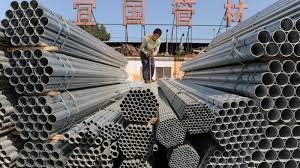Globaltraded.com — Japan, as one of the largest economies in the world, has diverse commodity needs that cannot all be met by domestic production. This makes Japan one of the largest importers of various types of commodities. Below are 20 types of commodities that are highly needed by the Japanese population, where the demand for imports from other countries is very high.
1. Fossil Energy (Oil and Natural Gas)
Japan is heavily dependent on fossil energy imports, including crude oil and liquefied natural gas (LNG), due to its limited domestic energy resources. Japan is one of the largest consumers of LNG in the world and imports most of its energy needs from the Middle East and Australia.
2. Agricultural Products
The demand for agricultural products such as rice, corn, and soybeans is very high in Japan. Although Japan produces a large amount of rice, high demand and limited agricultural land compel the country to import corn and soybeans from the United States and Brazil.
3. Fishery Products
Japan is famous for its high fish consumption. However, declining domestic fish catches have made Japan heavily reliant on fishery product imports, especially from Southeast Asian countries such as Indonesia, Thailand, and Vietnam.
4. Beef
The demand for premium beef continues to rise in Japan, but domestic production is insufficient. Japan imports large amounts of beef from the United States, Australia, and New Zealand to meet market demand.
5. Dairy Products
Japan imports most of its dairy product needs, including powdered milk, cheese, and butter, from Australia and New Zealand. Consumption of dairy products in Japan continues to increase, especially in the form of processed products such as yogurt and ice cream.
6. Coffee
Coffee consumption in Japan has increased significantly, making the country one of the largest markets for coffee in Asia. Japan imports coffee beans from various producing countries such as Brazil, Vietnam, and Colombia to meet domestic needs.
7. Chocolate
Japan is one of the largest consumers of chocolate products in Asia. However, since it does not have cocoa plantations, Japan relies heavily on cocoa imports from West African countries like Côte d’Ivoire and Ghana.

8. Tropical Fruits
Japan imports various types of tropical fruits such as bananas, mangoes, and pineapples from the Philippines, Thailand, and Ecuador. These tropical fruits are very popular among Japanese consumers, especially during the summer.
9. Sugar
Japan’s sugar needs are largely met by imports from Brazil and Thailand. Although Japan has domestic sugar production, it is insufficient to meet the high demand from the food and beverage industry.
10. Wheat
Wheat is one of the staple foods imported by Japan, especially from the United States, Canada, and Australia. Wheat is used in various food products such as bread, noodles, and pastries.
11. Iron and Steel
Japan’s manufacturing industry, particularly in the automotive and electronics sectors, relies heavily on iron and steel imports from countries like Australia and Brazil. Although Japan has an advanced steel industry, raw materials such as iron ore are mostly imported.
12. Paper and Pulp
Japan imports most of its paper and pulp raw materials from North America and Scandinavia. The large publishing and printing industry in Japan drives the demand for these products.
13. Wood
Japan imports wood from Canada, Russia, and Southeast Asian countries to meet its construction and furniture-making needs. The demand for high-quality wood remains stable due to ongoing infrastructure development.
14. Chemicals
Japan’s pharmaceutical and cosmetics industries rely on imports of various chemicals from Europe and the United States. These chemicals are used in the production of medicines, skincare products, and other health-related products.
15. Precious Metals
Japan imports precious metals such as gold and silver for industrial and jewelry needs. The main sources of these precious metals are South Africa, Australia, and the United States.
16. Consumer Electronics
Although Japan is a leading producer of consumer electronics, some essential components such as semiconductors and display panels are imported from other countries, including South Korea, Taiwan, and China.
17. Aluminum
Aluminum is a crucial material in Japan’s automotive and construction industries. The country imports aluminum from Australia, Canada, and Russia to meet domestic demand.
18. Natural Rubber
Natural rubber is a key material in the tire and various other industries. Japan imports natural rubber from Thailand, Indonesia, and Malaysia, which are the world’s leading producers.
19. Textiles and Apparel
Although Japan has a strong textile industry, the country still imports a significant amount of textiles and ready-made garments from China, Bangladesh, and Vietnam. The demand for high-quality textiles and branded clothing drives these imports.
20. Wine
Wine consumption in Japan is increasing, with a preference for imported wines from France, Italy, and Australia. These wines are highly valued by Japanese consumers, especially for special occasions and gifts.
In brief, the demand for various commodities in Japan reflects the country’s dependence on imports to meet its ever-growing domestic needs. The combination of limited natural resources and consumer preference for imported products makes Japan one of the most attractive markets for exporters worldwide. These commodities are not only an essential part of Japan’s economy but also offer significant opportunities for exporting countries to access one of the largest consumer markets in the world.
























































